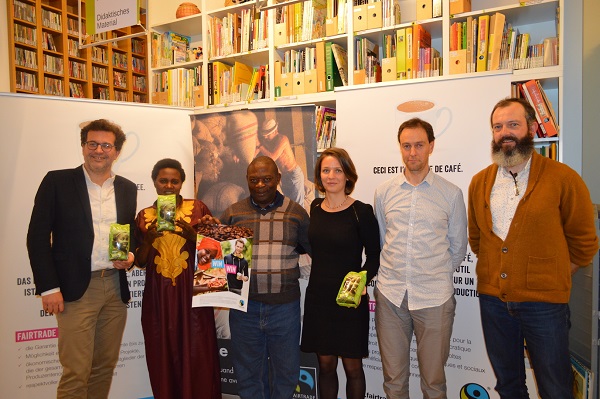
Two Congolese coffee producers of the SOPACDI cooperative, Joachim Munganga and Evelyne Sifa, introduced the results of the study which questions the sustainability of the coffee sector.
The most traded agricultural raw material in the world, coffee, supports 25 million farm families, mostly on small farms of less than 5 hectares. But under what conditions? Low prices paid to producers, the effects of climate change on harvests, the lack of resources to invest ... The concerns of producers in Africa and Latin America have multiplied in recent years. Since the end of the 1980s and the disappearance of the last International Coffee Agreement, which regulated world trade, producers are subject to the volatility of prices determined on the financial markets. Their revenues are generally lower and they do not have the ability to negotiate the terms of the sale of their coffee against traders, major international brands and distributors, who concentrate power.
More than 2 billion cups of coffee are consumed every day, generating a turnover of about 200 billion dollars a year. On average, the increase in demand for coffee is showing a steady upward trend of 2% per year, thanks in particular to the market for coffee capsules and coffee pods, which now account for 11% of world coffee sales. This evolution benefits an increasingly concentrated sector. Some players dominate the coffee market (Nestlé, JDE, Lavazza and Starbucks), which record record profits. This reflects the capacity of these main brands to create and keep the value downstream of the chain, thanks to the "immaterial" dimension of the marketed products: innovation, brand image, specific formats, specialised networks and more generally consumer universe that exceeds the taste qualities of the products. Yet, despite this explosion in its global valuation, international prices collapsed this autumn to below the symbolic 1 dollar / pound, to the point that some Latin American producers are refusing to sell their production.
The incomes of industrialists and brands continue to grow while those of producers stagnate or even decrease. They also suffer the full costs of the "hidden" costs of unsustainable production: climate change, pollution, poverty ... The situation is even more serious for producers as their production costs increase (increasing price of food, labour and inputs) as world prices fall. For example, in 2017, Peruvian and Ethiopian producers received 20% less income than 12 years ago, and remain well below the poverty line.
The low margins that producers emit discourage investment, resulting in lower yields and quality that ultimately affect the price they get for their coffee. Without sufficient means to maintain their plots and sometimes even to harvest all of their coffee, forced into debt to meet their basic needs, many of them find themselves trapped in a "poverty trap". In many areas, the profession of coffee grower loses its attractiveness and younger generations are turning away. Families who grow coffee often suffer from malnutrition and high rates of illiteracy; their impoverishment is fuelling the phenomena of migration and drug trafficking.
These developments take place in a context of increasing impacts of climate change on coffee production, especially Arabica: yields and the quality of harvests are regularly affected, with an increase in production costs and a decline in the incomes of farmers and producers. According to an external study, without a strong action to limit the consequences of climate change, around 50% of the surface currently used for growing coffee would no longer be suitable by 2050.
All of these economic, social and environmental impacts are weighing on the economies of the countries of production: for example, in Peru and Ethiopia in 2017, each dollar linked to coffee exports generated in 2017 respectively, 90 cents and 86 cents hidden costs borne by these countries and their population (the "societal costs"), with Colombia emerging better thanks to a better valuation of coffee for export - results that illustrate the unsustainability of the industry in these two countries.
Fair Trade: a tool that works but can not succeed alone
Action levers for more equity
- the effective implementation of the duty of vigilance (in particular on the payment of decent incomes and wages) by the actors of the sectors, in particular the three major actors, and who have the means to review their remuneration policy producers;
- major research programmes on agroforestry to support the evolution of production methods towards greater economic and ecological resilience, as well as to meet the challenges of climate change.
Finally, the study stresses that fair trade is indispensable when no serious regulation protects small producers, whether in the face of price collapse or against unscrupulous intermediaries.








